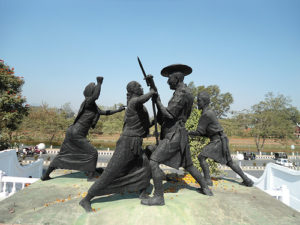Women as torch-bearers: Meira Paibis in Manipur
The movement that changed the image of women and stirred their involvement in the society and governance of Manipur.

F
rom banning of alcohol and drugs in the state of Manipur to political intervention, the Meira Paibis are recognised for stirring social mobilisation for attainment of civility and justice. A protest made this year by the Meira Paibis with the different student unions of Manipur in Delhi against the ‘mysterious’ killing of a Manipuri youth in Noida, Uttar Pradesh, demanding for justice and CBI enquiry of the same.
Taking social mobilisation into consideration, the historic protest of 12 naked women outside the Kangla Fort in Manipur and the outrage that ensued against the brutal killing and rape of Manorama Thangjam by armed personnel in Manipur ushered a movement. On July 15, 2004, the women in Imphal Valley voluntarily took the protest outside the Kangla Fort where the Assam Rifles were stationed. They stripped themselves naked in front of the Fort with the banners “Indian Army rape us” and “take our flesh”. They shouted and protested against the inhuman killing in the name of ‘operation’ carried out by the army.
‘Meira Paibis have been at the forefront of so many social issues. They have been working relentlessly towards the realisation of social emancipation in so many ways.’ – Professor Ksh Bimola, Manipur University.
The Meira Paibis have been recognised as guardians of the society, the torch-bearers in the darkness and the mothers of the society. Literally, the name Meira Paibi meaning ‘torch-bearers’, signifies the image of that of a mother in a household or a family. This gives rise to the emergence of the idea behind holding a Meira (lamp), which symbolises a mother. An all-women group that developed immensely and are based in every area or locality in Manipur.
What urged the women to organise the movement?

The idea that triggered the emergence of all-women group in a conservative society like the Meetei community in Manipur intrigue the people. The Meira Paibis, which developed as a social movement in the 1980s is believed to have erupted right from the British era.
Acts of vigilantism, staging protests and dharnas, moral policing and fighting against the Armed Forces have been their major concerns and actions. Ordinary women coming together voluntarily to tackle the existing social immoralities within the state was something new. The sound produced by a stone hitting an electric post was a call to gather when necessity arose during any time of the day. From issues of pre-marital affair to protesting against the Armed Forces, they took initiatives to safeguard the identity of the community.
Their activism during the British era began with certain incidents where the women of the Imphal Valley fought against the British orders for collecting teak wood in Kabow Valley. Additionally, the women protested against the continuous export of rice outside the state and the price hike of rice pertaining to the scarcity of food in Manipur, famously known as the first and the second Nupi Lan. In the late 1970s, the increase in consumption of intoxicants was alarming in the state. The women of a locality in Kakching, Thoubal district in Manipur took the initiative of banning alcohol, drugs and intoxicants. They were labelled as the Nisha Bandis.
The implementation of the Armed Forces Special Powers Act, 1958 was extended to Imphal Valley in the 80s. The Meira Paibis protested against the impunity of the Act which infringed the human rights of an individual in the most destructive way.
“In the 70s, Nisha Bandis were in existence but later with the enforcement of draconian law and its repercussions in the Imphal Valley (encounter killings of Rose, Luingamla, and Manorama and fast by Irom Sharmila) protests were taken to the state level.”
-Shanti Angom, an active member of the Meira Paibis.
The Meira Paibis played a diverse role in safeguarding the dignities of both social and a civil society. The bravery and solidarity depicted in the actions carried out popularised the movement in a way that it has also played an important role in the affairs of the state.
‘We’ve been fighting against drug abuse, crimes against women, and the Armed Forces Special Powers Act (AFSPA). We will continue to fight these.’
-A.K.Janaki Leima, one among the founders of Meira Paibis.
The immense growth and popularity of the Meira Paibis has reached its pinnacle. But the assurance of its strong continuance is indicated owing to tasks taken up by them presently. It proves a sense of proficiency and solidarity as an organisation in directing such a movement, a movement to sustain peace and tranquillity in every area of the state and a drive towards the attainment of justice.
